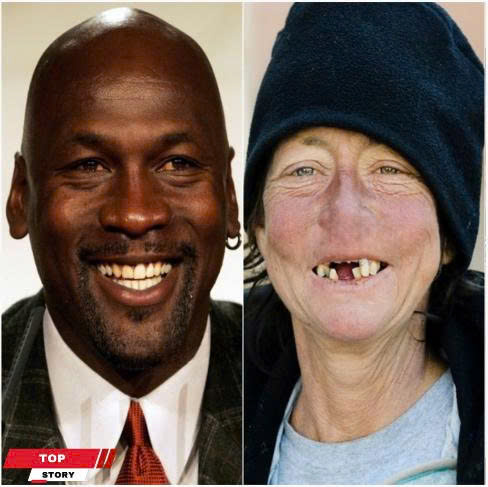Michael Jordan was moving quickly through the busy bus terminal in Chicago when a fragile voice rose above the constant hum of travelers. “Sir, please. Just a dollar.” He stopped, turning toward a woman bundled in layers of dirty clothes, her beanie pulled low over hair that hadn’t been cared for in a long time.

Her hands shook, not from the cold but from desperation. Her name, she said when he asked, was Taylor Winslow. That simple question startled her; no one had bothered to ask her name in months. When Jordan gently asked how long she had been on the streets, she explained that it had been eight months since her life unraveled. Before that, she had worked for twelve years as an ICU nurse at Northwestern Memorial. She had cared for countless patients, pulled endless 16-hour shifts, and endured the worst of the pandemic until the trauma broke her. She lost her job, her apartment, and eventually her stability.
Still, she clung to her nursing identity, keeping her license valid through online courses at the public library, convinced that beneath the grime, she was still a nurse. Instead of reaching into his pocket for a dollar, Jordan handed her a folded piece of paper with the name and number of a vocational rehabilitation director who specialized in helping healthcare workers heal from trauma. He explained that the program offered temporary housing, counseling, retraining, and basic support like clothing and transportation. When Taylor hesitated, fearing another false promise, he reassured her.
If this didn’t work out, he would help her find another path. At that moment, a wealthy socialite named Brooklyn Tate swept by, scoffing that Jordan was being manipulated by “a street-level addict.” Taylor flinched at the cruelty but then found her strength. She described the reality of her nursing career: the endless nights, the code blues that never had a chance, memorizing drug protocols in her head, catching subtle changes in breathing before the machines picked them up, and the crushing period when she lost seventeen patients in just two weeks. She wasn’t an addict, she said—she was a professional destroyed by trauma. Jordan didn’t flinch.
He handed Taylor his phone and encouraged her to call the number. He had already texted the director, Dr. Sarah Chen, who answered right away and scheduled an assessment for that very afternoon. By now, the curious crowd had shifted from watching to acting. A retired nurse offered Taylor professional clothes, another person handed over toiletries, a nearby church extended the use of their showers, and someone volunteered a ride. Brooklyn continued to sneer, predicting failure, but strangers came together to restore dignity. Within two hours, Taylor was clean, dressed, and looking every bit the professional she had always been.
Three months later, Taylor walked through the halls of Northwestern Memorial Hospital in fresh scrubs, her ID badge reading “RN, BSN—Nurse Supervisor, ICU.” The program had delivered what Jordan promised: housing, counseling, and updated training. She had stepped into a leadership role, mentoring younger nurses and reminding them to learn from mistakes and never stop caring. When an anxious husband waited desperately for news after his wife’s surgery, Taylor made sure the surgeon spoke with him, giving reassurance that reminded her why she had chosen this profession in the first place—because caring was her greatest strength.
Jordan checked in often. On one call, Taylor told him she had just been offered a permanent supervisory role with full benefits. She thanked him profusely, but he reminded her she was repaying the kindness every day through the lives she touched. By then, she had already started a peer support group for nurses and other healthcare workers traumatized by the pandemic. Dozens joined, and many found their way back to work. Meanwhile, video of Brooklyn’s callous remarks had gone viral, costing her charity board positions and tarnishing her reputation. Ironically, donations to homeless outreach and trauma-recovery programs soared in response, as the public rejected cynicism in favor of compassion. Months later, Taylor encountered Brooklyn outside the hospital.
This time, Brooklyn was humbled, shaken, and asking for forgiveness. Taylor gave it but insisted on accountability—if she wanted redemption, she should show up at the rehab center at 6 a.m. like everyone else, no special treatment, just service. Brooklyn agreed, beginning a quieter path toward repair. Over the years, the Second Chances fund co-founded by Taylor and Jordan helped hundreds of healthcare workers reclaim their lives. Many who once thought they were broken became leaders in outreach.
Standing before a packed conference hall at a national wellness event, Taylor shared her message: job-related trauma is not personal failure, and asking for help is not weakness. Afterward, she and Jordan dreamed even bigger, planning to extend their support to teachers, first responders, and anyone carrying scars from service to others. Taylor often reflected on that night in the terminal, on the way everything began with a small, almost ordinary act. A man stopped, asked her name, and listened. Sometimes the smallest gesture of recognition is the spark that rebuilds not just one life but many more.





